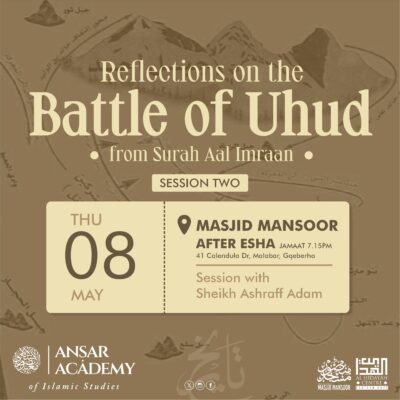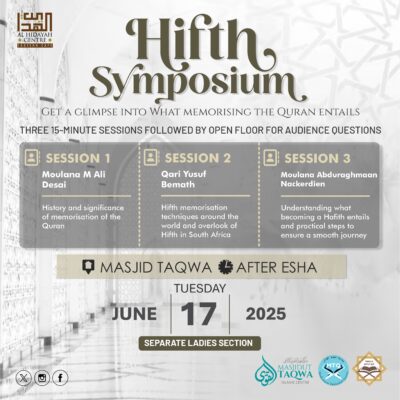There are several lessons in Surah Hashr, the 59th chapter of the Noble Quran, which are relevant to our current situation and which can be applied to our lives in general:
Lesson 1: Situations can change drastically and rapidly
“It was He (Allah) who drove those who suppressed the truth from among the People of the Book out of their homes at an early stage of the siege. You did not think they would go, and they thought their strongholds would defend them against Allah. But Allah came upon them from an unexpected quarter and cast such terror into their minds that their houses were pulled down by their own hands as well as by the hands of the believers. Learn a lesson, then, O you endowed with insight.” (Quran 59:2)
The Jewish tribes had settled in the old Yathrib which was to become Madinah Munawwarah. Among them was the Banu Nadheer, descendants of Prophet Haroon alaihis salaam. Their forefathers were scholars of the Torah which gave a detailed description of the last Prophet sallallahu alaihi wa sallam and his migration to Madinah Munawwarah. They settled in the city in the hope of joining the final Prophet sallallahu alaihi wa sallam.
They were living settled lives in largely self-sustained forts. They played a pivotal role in the economy of the city state and had earned the trust and respect of the Arabs.
A situation arose where two people were killed mistakenly and the blood money had to be paid by the Muslims and the Jews, their fellow citizens and allies. Rather than accept this demand of the mutual agreements in place, Banu Nadheer conspired to assassinate Prophet Muhammad sallallahu alaihi wa sallam. The outcome of their failed attempt was that they were given 10 days to leave their settlements and go into exile.
Within a few short days, their established lifestyle of decades was in turmoil.
We should not allow complacency to make us unmindful. We can become comfortably accustomed to a certain way of life and standard of living. We have plans chalked out for ourselves, our houses, businesses, investments and kids. And then all of a sudden something can come along and either cause a temporary disruption or a permanent one.
With Covid-19 it was government laws forbidding certain trades, travel and closing down schools.
The first thing that this needs to reinforce is our belief that Allah Ta’ala controls, directs and determines all situations in life.
The second thing is to evaluate our lives and determine whether we are doing things to bring about the Anger of Allah Ta’ala. The Noble Quran sets out the reason for the Jews undergoing this disaster:
“That is because they were hostile to Allah and His Messenger. And whoever has hostility with Allah (must know that) Allah is severe in punishment.” (Quran 59:4)
The Jewish tribes faced exile because of their hostility to Nabi sallallahu alaihi wa sallam. How many a command of Allah Ta’ala and His Prophet sallallahu alaihi wa sallam might we not be violating?
We should never fall into the trap of thinking that no immediate or visible punishment is coming upon us and thus be deceived into assuming that we have some sort of immunity.
Allah Ta’ala notes this mentality among the Jews of Madinah Munawwarah. They used to address Nabi sallallahu alaihi wa sallam in a derogatory manner and then say:
“Why is Allah Ta’ala not punishing us because of what we are saying?”
The general rule is that disaster strikes when materially things are going smoothly, and the wealthy are flourishing:
“When We wish to destroy a town, We command its wealthy people who lead easy lives (to do good) but they defiantly disobey! Thus the Divine Word (of punishment) takes effect against that town, and We annihilate it totally.” (Quran 17:16)
The citizens sink into ever worsening sins until it all falls apart.
Ibn al Jawzi rahimahullah notes that not seeing any expected punishment and thinking one is not being punished when committing sins is in itself a punishment. There is little hope of such people seeing the need to reform.
He goes on to say that the punishment could take on an intangible form at times such as in the case of the Israelites. They asked why they were not being punished for sinning. In reply they were asked that had they not noticed that the sweetness they used to experience while worshipping Allah Ta’ala had been taken away. People are deprived of foresight in decision making, implementing disastrous life plans, little realising that they are deprived due to sinning.
The hadith asks us to reflect on this by saying, “The slave of Allah Ta’ala is prevented from receiving his provision because of a sin he commits.” (Ibn Majah)
Lesson 2: Unity, not Uniformity
The second lesson is that disagreement and difference of opinion should not lead us to break our community bonds. When the Sahaba radhiallahu anhum went to confront the Jewish threat, they differed on a critical approach to neutralising the threat. Some argued that the sources of food should be cut off by chopping down the palm trees, while others put forward the opposite view. (Quran 59:5)
These divergent viewpoints did not deter them from being united in their overall objective of confronting the enemy threat, and in fact the Noble Quran affirmed that both the viewpoints were valid.
Having differing opinions should not lead us to becoming arrogant towards others, nor use vulgarity or be disrespectful. We need to focus on the fact that we need to deal together with many pressing issues that face us as a community such as rampant immorality, atheism, abuse, drugs and more.
In Surah Hashr we are taught about interpersonal relations with those who are not Muslim. In dealing with the Banu Nadheer threat, the channels of communication were still open. When Nabi sallallahu alahi wa sallam was in complete control of the situation and had full power to exact revenge and avenge their treachery and betrayal, he allowed them to leave with their possessions.
If this is the case with regards to non-Muslims, how much more do we need to display community spirit and have big hearts for our fellow brothers?
Lesson 3: Islamophobia and its reality
The threat of Islamophobia and meddling of countries in the affairs of Muslim lands stems from a deep-rooted, centuries old enmity. On an international level Muslims are dealing with it on an increasing basis. Mention is made of the reality of this onslaught in this Surah:
“They do not fight you, even assembled together, but in fortified towns, or from behind the walls.” (Quran 59:14)
In today’s context, they wage war behind ever more remote screens through drones, sophisticated long-range weaponry, and aerial artillery. When the Muslims under occupation look at it, it is very easy to become despondent. But the Noble Quran reveals to us the reality behind the scenes:
“Their hostility among themselves is severe. You think that they are united, while their hearts are divided.” (Quran 59:14)
The western European nations strive to present a seemingly unified front. But a quick glance behind the scenes reveals a different picture. World wars one and two were fought essentially as inter European conflicts. In 1453, when Sultan Mehmed II conquered the heart of Christianity, Constantinople, the Orthodox Church welcomed the Muslims for the religious freedoms they accorded them as opposed to their brothers in faith, the Catholics. In fact, in 1204 the Catholic Crusaders ransacked Orthodox Constantinople with a savagery and desecrated Orthodox churches.
When the Muslims came into Spain in 711, they were welcomed by the locals who had suffered under the Visigoths. Julian, Count of Ceuta, asked the Muslims for help when the Visigoth king Roderick raped his daughter.
The Irish Catholics suffered for decades under the British Protestants, and the brutality is well documented.
The message is quite clear, do not become disheartened when you see the elaborate conspiracies playing out, seeking to undermine the freedom of Muslim lands and occupy them. This is not something new or unexpected:
“And they worked out their plot and whatever they plot is before Allah, even though their plot is such as would move the mountains.” (Quran 14:46)
Their plots and schemes, elaborate enough to move mountains, are as old as Islam itself.
“The conspiracy of the devil is only to cause grief to those who believe.” (Quran 58:10)
The devil wishes to create despondency through the secret conspiracies that have been at work behind the scenes for centuries. Ibn al Qayyim rahimahullah mentions, “There is nothing more beloved to the devil than to make a believer sad in order to impede and interrupt his journey to Allah Ta’ala, and stop him from doing good deeds.” (Madarij al Saalikeen)
“Yet he (the devil) cannot harm them (the believers) at all, except by the permission of Allah.” (Quran 58:10)
Only if Allah Ta’ala wills in His Wisdom to allow their plans to succeed will they do so. In that event, rest assured that there will be a wonderful reason for the Muslims to endure it. Don’t ever think that any evil political system is too big or powerful to bring down. Apartheid crumbled, and the Soviet Union disintegrated by people chipping away at it persistently.
Not all things are as they appear to be. The enemy forces seem united but in reality there are serious fault lines in their alliances. A bitter family feud could maybe require a small thing that would bring everyone back together again.
Lesson 4: Don’t give up
Never give up when faced with a seemingly insurmountable challenge in life; whether attempting to study a course, or settle down in life, or make a success of a job, business or career, or survive an acute and nasty family crisis.
Who would have thought that man could soar so easily through the air, or that one day we could speak to or see someone on the other side of the world? Flight required the ideas of kite flying, da Vinci’s inspired designs of air machines, the discovery of hydrogen, balloons, theories in mechanics, gliders and thus on to heavier than air machines. Now we use unmanned flight as an everyday norm, such as with drones.
In World War two, the Germans had the enigma machine which made messages in code. These were ultimately cracked by the Allies and this source of classified information shortened the war significantly and may have determined its course.
Don’t give up on an idea or a dream or a plan no matter how big or impossible it may seem. The sin that seems too deep rooted to break, or the addiction that seems beyond defeat, can all be eradicated.








COMMENTS